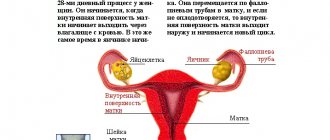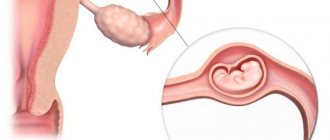When to start a conversation
An attentive mother is obliged to mentally prepare the child for this day in advance. But not everyone knows how to tell their daughter about menstruation in the most correct way. What to talk about and how to do it as tactfully as possible. Critical days can begin in girls at a very early age, up to 8 years old. Puberty can be either early or late. The sexual development of children depends on various physiological reasons, but regardless of age, the onset of menstruation is always accompanied by a change in the girl’s appearance.
The resulting changes, as well as unstable hormonal levels, can negatively affect the daughter’s well-being, so every mother should prepare for the menstrual cycle in advance in order to be ready to answer all questions of interest.
The main signs of approaching menstruation:
- your figure changes, your breasts begin to grow;
- hair begins to grow in places where there was none before;
- pimples, blackheads or dandruff appear;
- sweating appears;
- Due to the active work of the glands, the hair on the head begins to become dirty faster.
The onset of menstruation in adolescents is always accompanied by pain in the lower abdomen and poor health. Therefore, you need to warn your child about possible ailments and purchase painkillers in advance.
Features of talking about menstruation
In fact, it is difficult to explain to a girl what awaits her when she grows up. And this difficult task falls on the shoulders of the mother or another adult woman who has a trusting relationship with the child (elder sister, grandmother, aunt).
Of course, dad can tell a girl about menstruation, but he is unlikely to be able to give comprehensive answers to the million questions that arise. The thing is that only a woman knows all the subtleties of the process, and an impressive amount of embarrassment is added.
For the conversation to be successful, it is very important to think through all its points and draw up a rough plan so as not to miss anything important.
When choosing a place for conversation, it is important that it is comfortable so that the child can relax. The child needs to be explained the following basic points: at what age menstruation will approximately begin, this phenomenon will be repeated every month, what features the process has, what may be a little painful, as well as what phases of the menstrual cycle there are and what features they are characterized by.
The correct tone of communication is no less important for the successful outcome of the conversation. These should not be lectures that will only scare the child away. All explanations should be in a confidential and friendly manner, only in this case the girl will listen carefully, not be afraid or embarrassed.
The conversation needs to be divided into several stages. So, at the age of 9, a girl does not necessarily have to explain at one time everything that is known about menstruation, and how difficult it will be for her to experience it every month. First you need to prepare the girl, explaining that very soon her body will change, and if spotting appears, this will be a sign of the beginning of changes, so you should not be afraid. You also need to tell the girl that today there are special hygiene products on sale that are designed to provide comfort on critical days. A girl at this age can react to the information received in different ways: either many questions will arise that she needs to be prepared for, or she will simply nod and end the conversation.
Already this first conversation will give the girl an idea of monthly bleeding. The second time it will be possible to talk in more detail about all the intricacies of menstruation, when it already begins (11-13 years).
https://youtu.be/NqrjlvJ1Ku4
Preparing your child for a conversation
Every mother should know how to explain to a child what menstruation is. With the help of a conversation on such a delicate topic, you can prevent the appearance of complexes and protect against early pregnancy. That is why it is very important to clearly explain to the girl that menstruation is a natural physiological process that should not be embarrassed, but at the same time be extremely careful. At this time, the body begins to rebuild, as preparations for future motherhood take place. Moms should prepare for the conversation in advance.
The conversation should be confidential and at the same time fully reveal all the nuances.
- Psychologists advise starting a conversation with a child at the age of 10 years. Information should be accessible and easy to understand. At this age, there is no need to talk in detail about the anatomy of the female body. Suffice it to say that the daughter will soon become a girl, because she will begin to menstruate, pubic hair will appear and breasts will begin to grow.
- At the age of 12–13, girls can be presented with more specific information about the structure of the female body. It’s better to start the conversation by studying the anatomy of the female body. All information must be understandable and accessible. For convenience, you can use a medical book with pictures.
- During the conversation, it is better to focus on your own experience, talk about your feelings and experiences.
- In order to interest the child, you can turn on a scientific film for children or an educational cartoon. This is the easiest way to organize the learning process. The main thing is to watch the video together to explain unclear points or answer questions of interest.
- Be sure to mention that menstruation lasts from 3 to 5 days, as well as the importance of tracking your menstrual cycle.
Do not forget to tell the girl that with the advent of menstruation she becomes more mature and with the onset of sexual activity she can become pregnant.
What is important to tell
When talking about the beginning of the menstrual cycle with your daughter, you need to talk about all the physiological changes that occur in her body, but you should not limit yourself to just a general conversation. In order for the child to receive as much information as possible, do not forget about important topics.
When dedicating your daughter to the particulars of menstruation, you should talk about the following points:
- date of menstruation - individually (we are talking about both age and monthly discharge);
- the process of bleeding is not a pathology, but a stage of development of the body;
- features of the discharge itself (what it should be);
- possible presence of pain and discomfort;
- use of hygiene products (their types and rules of use);
- frequency of taking water procedures.
Be sure to tell about possible pain sensations, and that this is natural.
The parent should also explain to the daughter that menstruation should not be ashamed, but it is incorrect to talk about it openly, in the presence of strangers.
What you need to tell about hygiene features
When a mother or another family member is going to prepare a girl for her period, gynecologists advise purchasing hygiene items in advance in order to clearly show the child what they look like and how to use them.
Tips for parents! Virgins are recommended to use pads with a soft surface and a hypoallergenic type. It is not advisable to use tampons, even mini ones.
When introducing the girl to the pads, they explain that they should be changed at least once every 2 hours, regardless of how full they are. Changing the pad more rarely can lead to infection and an unpleasant odor.
It is advisable to take a shower (“wash yourself”) with each procedure. If this is not possible, use wet wipes. Be sure to talk about aesthetic rules. New hygiene products should be stored in a specific place where they will not be conspicuous. If a girl takes pads to school, then you can use a special case or a small handbag (for example, a cosmetic bag) where the pads will be kept.
Tell us about the rules for using gaskets
The moment is not missed about how to clean up after yourself. A young girl must know that the used pad is removed and thrown into the trash, dirty linen is immediately washed, and the bathroom is cleaned. If a girl takes proper care of her hygiene, this will save her from the risks of health problems and constraint in performing simple procedures.
What questions may need to be answered?
If the child is ready for this conversation and does not feel embarrassed, then it is quite natural to ask certain questions.
Parents need to be prepared to answer the most frequently asked questions from teenagers:
- what pain sensations are present;
- how heavy menstruation is;
- what is normal and what is not;
- what means are best to use;
- what to do if your period does not come or is delayed.
If an adult does not know how to answer a question, you can first consult with a gynecologist.
From this video you will learn tips for mothers during their first periods in girls:
https://youtu.be/YOYpDrkLIZI
What is better not to talk about
Until a certain age, and especially before the first menstruation, you should not inform your child about some of the features of the course of menstruation and the consequences of their onset.
When talking about the menstrual cycle, you should not say:
- about clear age periods when regulation begins;
- about possible severe pain and severe premenstrual syndrome;
- about menstruation as something shameful and vulgar.
If it is difficult for parents to decide on this conversation, you can turn on a cartoon telling the girl about menstruation.
You need to approach this topic after preliminary preparation. A properly structured conversation will help prevent psychological problems associated with puberty. Attentive attitude and support will contribute to the smooth flow of menstruation in girls.
Basic Concepts
The first menstruation is the main sign of puberty in girls. This is a physiological process of renewal and cleansing of the female reproductive organs to prepare the body for a possible pregnancy. Menstruation should be regular and occur monthly. The onset of puberty is accompanied by intense production of female hormones. Hormones are produced and change depending on the menstrual cycle. Therefore, it is very important to warn the child about changes in the body, as well as talk about the main differences between girls and young women.
At the next stage of the conversation, you should talk about the anatomical features of the female body in a language accessible to the child. The girl should learn more about the regulations, as well as why they happen every month. There is no need to overly intimidate the child with information about the painful sensations that accompany menstruation, but one should not remain silent about it either. The main thing is that the child understands the necessity of this process and is not afraid of the first symptoms.
Particular attention should be paid to the story about eggs, which begin to mature with the advent of menstruation and therefore, if you are sexually active, you can become pregnant. Don't forget to add information about the contraceptive methods that young people should use. Also, don’t forget to talk about PMS (premenstrual syndrome), which indicates changes in psycho-emotional state and causes a surge of hormones a few days before the onset of menstruation. PMS occurs against the background of hormonal changes in the body.
A conversation with her mother on this delicate topic will help the girl understand her body, and poor health and irritability will not take her by surprise. Knowing all the nuances of this topic, it will be easier for the child to cope with the unpleasant condition. If a girl is interested in communicating and gaining new knowledge, try discussing the topic of pregnancy at the same time. The information received from the person closest to you will help the child get to know his body and organism better.
How to tell your daughter about her first period - don't stay away
Now there are no problems in obtaining the necessary information. The Internet is always available. Each article, each video can tell a child everything they need about menstruation, without missing a single detail.
It seems that there is simply nothing to explain about menstruation; my daughter will understand everything herself. Actually this is not true. You cannot stand by when your child begins a new period of growing up. After all, it is known that it is the mother who is the closest person who can support and understand.
Understanding your child and the mental characteristics of his personality through System-Vector Psychology by Yuri Burlan helps to discard false embarrassment and not make mistakes on such a delicate topic.
Hygiene rules on menstruation days
The first menstruation begins with the appearance of small red or brown discharge. They are called menstrual blood. During the first 3–7 days, blood discharge is scanty, about 150 ml. The duration of the menstrual cycle varies from person to person and can range from 21 to 35 days.
Before starting sexual activity, it is best to use hypoallergenic pads. With them it is more convenient to monitor menstruation and change to a new one. You need to change the pad to a clean one 5 to 7 times a day. You can use tampons during menstruation only after the start of sexual activity. The tampon is replaced every 1.5 hours. This is important, otherwise you can provoke the development of infections in the vagina.
During menstruation you should not:
- Do gymnastics or physical education.
- Place ice or a heating pad on your stomach.
- Take a hot bath (even for your feet).
- Lift heavy things.
- Take medications without parental permission.
- Swim in a pool or open water.
All children should also learn the importance of washing and showering. During critical days, you need to wash yourself every 4-6 hours. You need to shower regularly.
How to approach an important conversation?
There comes a stage in every girl's life - the onset of menstruation or menarche. This turn of events can be perceived calmly and rationally if the girl has been previously prepared for some of the features of her condition, and if the mother or older sister has not taken care of the relevant knowledge in advance, the child may be afraid.
Of course, you can sit as long as you like and remember the times of the Soviet Union, when it was not customary to discuss the topics of sex, having children and issues of personal hygiene even with your own mother. But in the process of observing such strict rules, young girls were left alone with their experiences and a huge number of unclear questions.
The modern world is more liberated, rich in an exorbitant amount of various information in the library and the Internet, which will give answers to all the questions that arise, but who better than a mother can prepare a girl for this? Some mothers put off such an important conversation until “later”; when they look at their 9-year-old girl, it seems, “What’s her period? She’s still just a child, and how to start such an unusual conversation?”
There are many strange stories known, and you have probably encountered them in your life, when a growing girl thought that she was bleeding and was seriously ill with something, due to insufficient information. So, in order to avoid such incidents, you need to figure out how to explain to your future girlfriend what awaits her in the near future.
What should you emphasize when talking?
When talking, you should pay special attention to the following important points that all teenagers should know:
- In medicine, a regular menstrual cycle is considered normal, which occurs after the same number of days every month. The first few years the cycle may be irregular. There are also a number of reasons why the cycle can go wrong, for example, stress, climate change, heavy lifting. Such situations should be avoided because they are dangerous to health.
- The stability of the menstrual cycle is greatly influenced by the nutrition of a teenager. In order to lose weight as quickly as possible, many girls at this age begin to become interested in diets. It is important to explain to your child that an unbalanced diet, which does not contain the fats and carbohydrates the body needs, can provoke a change in the cycle and cause harm to health. To avoid problems, parents should talk about proper nutrition and closely monitor their daughter’s diet.
- It is very important to know how to tell a girl about her period, because this is an important sign of maturation of the reproductive system. This means that any sexual intercourse without the use of contraceptives can lead to pregnancy.
PMS - tell your girl about it
Tell your daughter what menstruation means and how it happens. Emphasize that this is a natural process. As soon as the child understands what awaits him, he can talk about painful sensations. And in this matter it is necessary to prepare the girl very delicately. There is no need to say that it is very painful, and this will happen every month. Try to explain that all processes occurring in the body are individual. Perhaps she will have no pain at all. It’s better to tell us more about the premenstrual period. Weakness, irritability, increased appetite, fatigue - these are the symptoms that she may feel before her period. Explain that this will pass soon. Emphasize that during menstruation it is forbidden to overexert yourself both physically and emotionally, otherwise the cycle may go wrong.
Opinion of gynecologists
Many girls and even adult women are afraid to visit a gynecologist, which can lead to extremely negative health consequences. Therefore, it is the responsibility of every mother to instill in her daughter the habit of not being afraid of this specialist and visiting him regularly.
There are mothers who do not take their daughters to see the doctor because she is a virgin. It is not right. If a girl is not sexually active, she is examined through the rectum. Therefore, everyone needs to undergo regular examination.
How to successfully organize a conversation
It is important to start an intimate conversation correctly.
There is no need to do this very abruptly (go straight to the point). If you tear a girl away from some activity, sit her down in front of you and announce with a serious look that she is now learning something very important, then the child may simply withdraw into herself or subconsciously perceive the information negatively.
The wrong moment can ruin an entire important conversation.
It is best to choose a time when the mother and daughter are alone at home, the girl is not particularly busy with anything and is definitely in a good mood. Alternatively, you can talk while walking, for example, in a cozy square or park where there are no people nearby.
It’s good to start the conversation by discussing related topics, for example, noticing how your daughter has changed lately (prettier, seems more mature), and then smoothly move on to a topic that worries her mother.
A woman must also provide for a soft tone of conversation, inviting facial expressions (no need to make a too serious face), and gestures.
An appropriate tone, smile, tactile contact are the keys to a successful conversation with a child.
An interesting technique is to initially arouse the girl’s curiosity: for example, show the pad and ask, “Do you know what this is? Are you wondering why this is needed?
You can pique your daughter's initial interest by showing her the pad.











